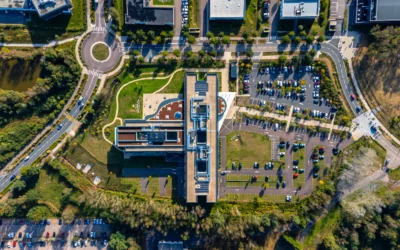The national Heat Fund financed nearly 1,350 new installations and 384 km of networks in 2024 • he European Metropolis of Lille, Ilénergie: A national-scale heating and cooling network •Bellac: A new biomass heating plant to strengthen the district heating network by 2027 • Read more about the developments in sustainable heating and cooling in this month's news update from France
With a budget allocation of €820 million in 2024, the Heat Fund financed nearly 1,350 installations producing 3.6 TWh/year of renewable and recovered heat, according to ADEME, Agence de la transition écologique, which manages the fund.
The fund primarily subsidized investments, feasibility studies, stakeholder management, the geothermal guarantee fund, and a loan scheme for social housing (in partnership with Banque des Territoires).
Investment aid breakdown:
Biomass energy continues to dominate the landscape of renewable and recovered heat production in France. In 2024, the projects supported by the Heat Fund are expected to generate a total of 3.6 TWh per year. Of this, biomass accounts for the largest share at 68%, followed by geothermal energy at 16%. Waste heat and methanization each contribute 8%, while solar thermal energy represents a modest 0.3% of the total output.
In 2024, the projects supported by the Heat Fund are expected to avoid approximately 805,750 tonnes of CO₂ emissions annually. The average cost of abatement is estimated at €51 per tonne of CO₂ avoided, while the cost-to-production ratio over a 20-year period stands at €11.4 per MWh.
Additional funding has been allocated to support industrial heat production through national programs. These initiatives are expected to contribute 8.6 TWh per year of renewable and recovered heat to the industrial sector. Two major calls for projects have further reinforced this effort: the BICAT and BCIB programs.
In 2025, the budget for the Heat Fund was maintained at €800 million. Looking ahead to 2026, the Minister for Public Accounts, confirmed that the Heat Fund will be continued.
Read more in article from Banque de Territoires
The European Metropolis of Lille (MEL) has awarded Dalkia a 20-year concession, beginning on November 1, 2025, to manage a new large-scale heating and cooling network across six municipalities in the region. This ambitious initiative, named Ilénergie, aims to deliver local, green, and affordable energy to the equivalent of 75,000 homes.
Spanning 180 kilometers of pipelines, Ilénergie will become the third-largest heating network in France, following those in Paris and Lyon. It is expected to distribute over 720 GWh of energy annually. In addition, a 5-kilometer cooling network will be deployed in Euralille to help mitigate urban heat islands.
By 2030, the energy mix will consist of 89% renewable and recovered energy sources. These include waste heat from local industrial sites such as Refinal, Lesaffre, and Kuhlmann; thermal energy from treated water at the Ovilléo wastewater treatment plant; energy recovered from the Halluin Energy Recovery Center; and locally sourced biomass (, 75% of which will be transported via waterways from within a 25-kilometer radius).
A new biomass heating plant will be constructed on the Lever brownfield site in Haubourdin, accompanied by a wide range of environmental measures (plantation of trees, solar panels on production sites, low-carbon vehicles and re-use of treated water).
Beyond its environmental benefits, Ilénergie is designed to offer cleaner, more local, and more cost-effective energy, with competitive and stable pricing that remains below the cost of natural gas.
Read more in article from Lille Metropole
On July 22, 2025, the town of Bellac signed a contract with ENGIE Solutions for the design and operation of a biomass heating plant that will expand the town’s existing district heating network. The facility is scheduled to be commissioned in the summer of 2027 and will supply over 70 buildings with local and sustainable energy, helping to avoid approximately 2,300 tonnes of CO₂ emissions annually. The network will be powered by more than 95% renewable energy, primarily biomass.
Located in the Jolibois neighborhood, the heating plant is designed to integrate harmoniously into its surroundings, with minimal visual impact, limited noise pollution, and optimized logistics for fuel deliveries. A self-consumption photovoltaic system will cover the site’s electricity needs. The use of biomass will also support the local wood industry, with 3,500 tonnes of wood chips sourced from within a maximum radius of 50 kilometers.
The heating network will serve a wide range of facilities, including social housing, high schools, a nursery school, the hospital, the mobile gendarmerie barracks, the departmental administrative center, municipal technical services, and the nursery. Thanks to digital integration, each user will be able to access network information and interact with the service.
To manage the project, the municipality has established a Public Service Delegation (DSP) named Bellac Énergies Renouvelables, with a dedicated operations team overseeing heating networks across the region, including Limoges, Saint-Junien, Saint-Yrieix-la-Perche, Felletin, Guéret, and Bourganeuf. The project represents a total investment of €9.1 million, of which €2.8 million (30%) is funded by ADEME. Its goal is to ensure long-term stability in urban heating costs while reducing dependence on fossil fuels.
Read more in article from Engie Solutions
To stay updated on news for sustainable heating and cooling, follow us on LinkedIn, and subscribe to our Newsletter.
Sweden is at the forefront of decentralised heat networks technology. Our aim for “Sustainable Heating & Cooling by Sweden” is to facilitate knowledge sharing between British, French and Swedish stakeholders and develop and encourage environmental and economic best practice.
To find out how we can help you and your organisation, please contact our London or Paris-based “SHC” teams. We can introduce you to leading consultants, suppliers of technology and services who will be pleased to share know-how of the development of sustainable heating & cooling solutions.


